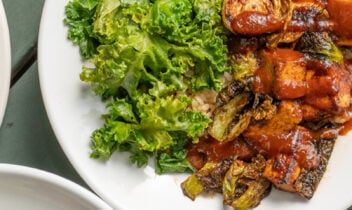
Love Potions: Aphrodisiac Fruits & Vegetables To Get Your Heart Pumping
Could there have been an ulterior motive when Eve so hastily swiped that forbidden fruit? Maybe she did just want to have fun. A little trouble sure beats sitting in a garden for eternity! We’ll blame Adam. I mean, who doesn’t like a tall muscular man who does what he’s told?
Many foods in cultures around the world have a history of stimulating heart tempting desires. The term aphrodisiac stems from Aphrodite, the Greek goddess of love, beauty, pleasure, and passion. Her love for Adonis, the god of beauty and desire, caused flowers to bloom and fruits to ripen. Picture an ancient Beyoncé performing in the Roman Colosseum.
Are there aphrodisiac foods that work? Dark chocolate-covered strawberries aren’t exactly Cupid’s arrow, but certain foods are a little more likely to help enhance your mood and get your heart pumping this February. Onto the science…
As explained in my previous blog The Plant Prescription For A Better Mood fruits and vegetables have benefits to emotional wellbeing. It’s important to note that 90% of our serotonin receptors are in the gut. When the balance of good and bad bacteria is disrupted, diseases like IBS, obesity, metabolic syndrome, type-2 diabetes, heart disease, and mood problems can manifest. Our body systems are intricately interconnected, and you really are what you eat. A recent study shows that eating a healthy, balanced diet that avoids inflammation-producing foods is protective against depression. Pairing exercise with a better diet is equally as important, as each can amplify the effect of the other. Refrain from using food and exercise as the only treatment for moderate to severe mood problems. Watermelon won’t save a failing relationship, but it could make for a fun, flirty date night.
Nutrition (unlike many of our heart-felt hopeless romantic decisions after a few glasses of wine) isn’t just from the neck down. Many fruits and vegetables commonly recognized for having aphrodisiac effects are also heart-healthy. Coincidence? Not so much…
The cerebrovascular system is a complex network of arteries and veins critical for moving oxygen- and nutrient-rich blood into and out of the brain. Did you know about 2.5 to 3 cups of blood flows through the adult brain every minute? Habitual consumption of fruits and vegetables can help protect the endothelium, or layer of tissue that lines the inside of blood vessels, from constriction and plaque buildup. A healthy endothelium relaxes in the presence of fruits and vegetables to ease blood flow.
Looking for a few healthy aphrodisiac foods? If your love language is food, there are certainly fruits and vegetables to help set the mood:
- Dark chocolate-covered strawberries contain high amounts of flavan-3-ols that help stimulate blood flow
- Watermelon may help increase libido due to its high L-citrulline that can promote dilation of the blood vessels
- Asparagus, rich in vitamin E and potassium, was once consumed by 19th century French grooms the day before their wedding in preparation for the big night
- Cleopatra and her notorious Venetian lover Casanova were infatuated with zinc-rich oysters
- Fenugreek has been suggested to increase sexual arousal and desire
- The ancient Aztecs gave avocados a reputation of being an aphrodisiac. The Aztecs wouldn’t allow virgins to leave the house while avocados were being harvested, and avocados were once outlawed by Spanish Catholic priests because of their supposed sensuality.
If your desire is to be in the mood for… delicious food (wink, wink) or heart health this February, fruits and vegetables have you covered! It is worth noting that many aphrodisiacs do not have the backing of scientific evidence, and some products may have negative side effects. If you’re thinking of trying a dietary supplement, talk to your Registered Dietitian Nutritionist (RDN) first.


